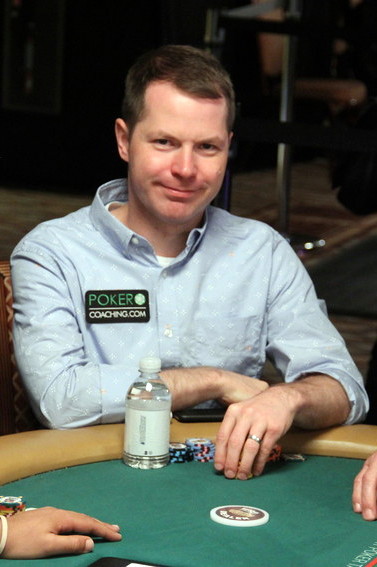






Slowplaying When Short Stackedby Jonathan Little | Published: Nov 02, 2022 |
|
|
 If you want to increase your poker skills and learn to crush the games, check out Jonathan Little’s elite training site at PokerCoaching.com/CardPlayer.
If you want to increase your poker skills and learn to crush the games, check out Jonathan Little’s elite training site at PokerCoaching.com/CardPlayer.
I was fortunate enough to make the final table recently in a small-field $10,000 buy-in tournament with 21 big blinds. There were no obvious short stacks, so I was not overly concerned with moving up the payout ladder because no one was “guaranteed” to go broke in the very near future.
With seven players at the table at blinds of 10,000-20,000 with a 20,000 big blind ante, a loose, aggressive player raised to 43,000 from second position out of his 1,000,000 stack.
I looked down at A A
A with a 420,000 stack.
with a 420,000 stack.
While many players three-bet, this is an excellent spot to call because it protects my calling range against the initial raiser and it also gives one of the players yet to act a chance to go all-in, allowing me to easily get my entire stack in before the flop.
I called, as did the cutoff and the small blind.
While some players would view the multiple callers as a disaster, professionals realize this is an amazingly profitable situation. Most of the time, someone will make one pair and be unable to fold.
For example, if I am against K-J, Q-9, and 4-4, and the flop comes K-7-5 or Q-7-6, I am almost certain to double up. Of course, I will occasionally run into a flop like K-9-4 or K-J-5 and go broke, but the risk is well worth the reward.
When you have a short stack, your main goal with your absolute best hands should be to extract value, not protect them from hands that are drawing relatively thin.
The flop came 9 9
9 6
6 . The small blind checked and the initial raiser bet 93,000 into the 219,000 pot.
. The small blind checked and the initial raiser bet 93,000 into the 219,000 pot.
 is worth noting that this large bet is almost certainly not good in a situation where all his opponents can have trips and he probably does not have too many trips in his range.
is worth noting that this large bet is almost certainly not good in a situation where all his opponents can have trips and he probably does not have too many trips in his range.
At this point, I had to decide if I should go all-in or call. Folding is out of the question because even though I could be against trips, my hand is too strong. If I call, I will allow either of the players yet to act to call with their strong draws, whereas if I go all-in, I will make them fold. If anyone has a strong made hand, such as Q-Q or 8-8, I want to get all-in now because a scary card could come on the turn that would allow them to get away cheaply.
Either way, I am accepting that if someone has trips or a full house that I am going broke. I did not think that someone yet to act would run an insane bluff if I called. Since calling and going all-in have the same result most of the time except when I am against a draw, and I want the draws to fold because they have excellent equity…
I decided to go all-in, and I was surprised to see everyone instantly fold.
I did not expect the initial raiser to make a decently large continuation bet into three players on a somewhat coordinated board with absolutely nothing, but he did.
Seeing how he likely had a marginal hand, if I went all-in before the flop, I would have ended with a 530,000-chip stack. Instead, I ended with a 706,000 stack.
To achieve this result, I had to take on a bit of risk, but it was worth it. Of course, someone could have flopped a decent one-pair hand then I would have likely doubled up. Do not be afraid to slowplay A-A when you are shallow, especially if calling (instead of three-betting) will not tip your opponents off to the fact that you have a premium hand. ♠
 Jonathan Little is a two-time WPT champion with more than $7 million in live tournament earnings, best-selling author of 15 educational poker books, and 2019 GPI Poker Personality of the Year. If you want to increase your poker skills and learn to crush the games, check out his training site at PokerCoaching.com/cardplayer.
Jonathan Little is a two-time WPT champion with more than $7 million in live tournament earnings, best-selling author of 15 educational poker books, and 2019 GPI Poker Personality of the Year. If you want to increase your poker skills and learn to crush the games, check out his training site at PokerCoaching.com/cardplayer.
Features
Tournaments
Strategy